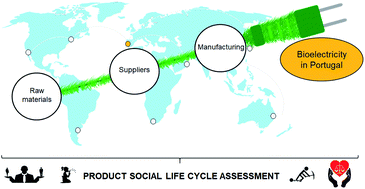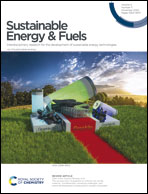A protocol for the definition of supply chains in product social life cycle assessment: application to bioelectricity†
Abstract
In order to promote sustainable energy systems, decision-makers should take responsible choices across the entire product system, taking into account not only economic and environmental criteria but also social indicators. This is especially critical in bioenergy systems since they usually involve complex supply chains. However, this “supply-chain” perspective is not often considered when putting into practice Social Life Cycle Assessment (S-LCA) of product systems. This study presents a novel approach that enlarges the scope of conventional life cycle inventories (LCIs) in order to identify supply-chain paths within the boundaries of a product system. Conventional LCIs allow defining the main flows of components, materials and/or energy throughout the supply chain of a product, while the additional use of trade databases helps identify the country of origin of these flows. After the identification of the product's supply-chain paths, the social LCI of the product system is further ellaborated with economic and social data. This approach was tested through the S-LCA of bioelectricity in Portugal, thereby encompassing more than 400 processes within seven tiers of the supply chain. Social life cycle impact assessment results include child labour, frequency of forced labour, gender wage gap, women in the sectoral labour force and health expenditure, using the PSILCA database and method. Potential social impacts were found to be concentrated in the following processes: ammonia and N-based fertiliser production in Algeria; crude oil extraction in Russia, Kazakhstan, Saudi Arabia, and Azerbaijan; and operation and construction of the bioelectricity plant in Portugal.



 Please wait while we load your content...
Please wait while we load your content...